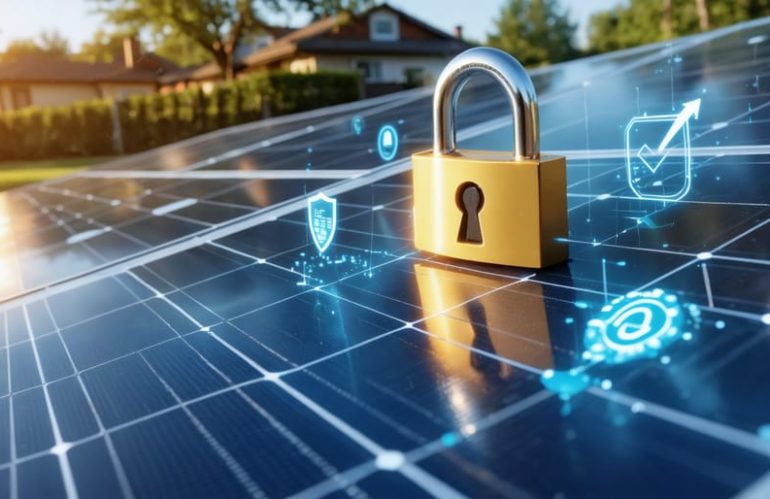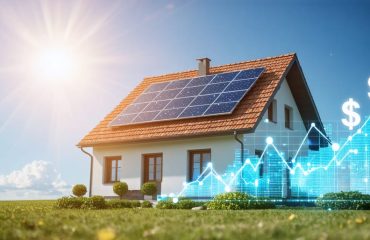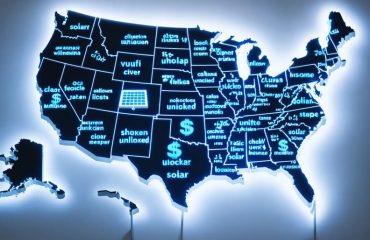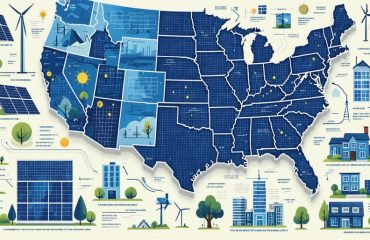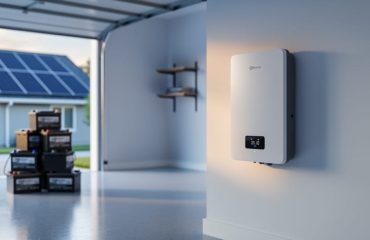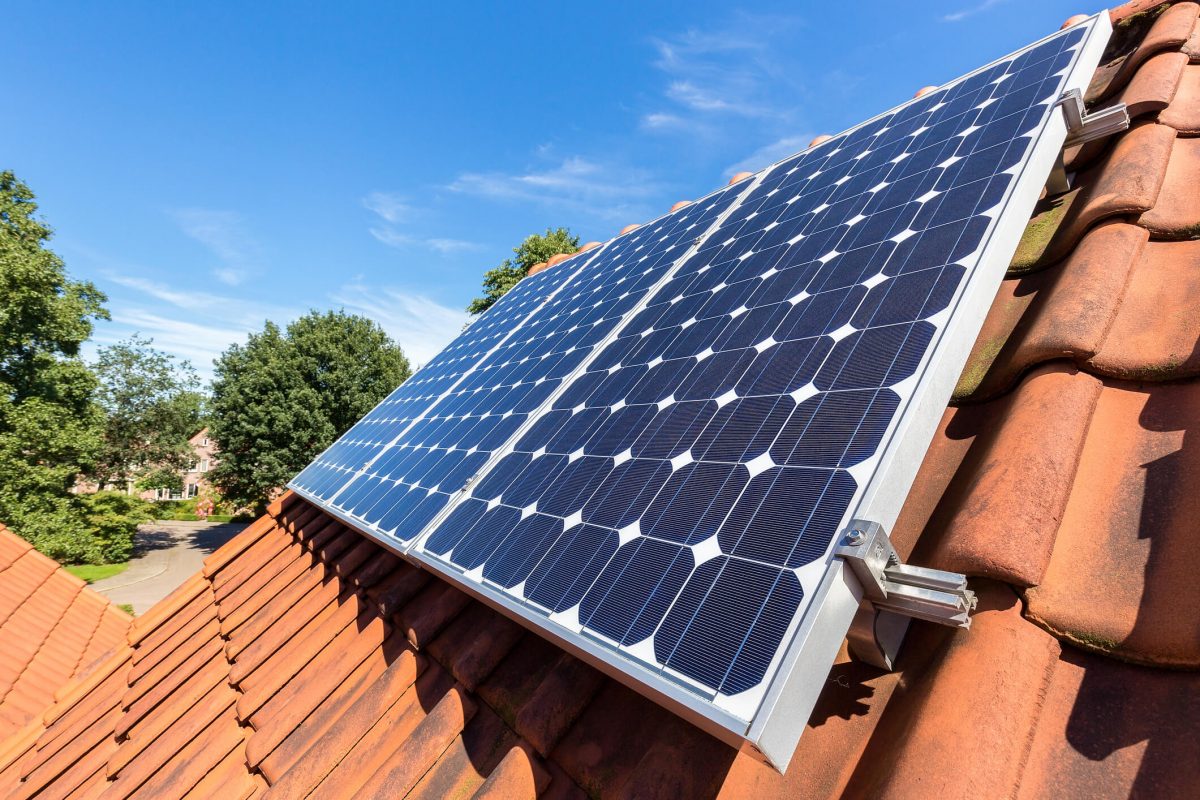Solar panel regulations protect homeowners while maximizing the benefits of clean energy investment. Following essential solar panel safety tips and compliance standards ensures your installation meets local building codes, qualifies for tax incentives, and operates safely for decades to come. Recent updates to national energy policies have streamlined the permitting process, making it easier than ever for homeowners to go solar while maintaining strict safety standards. Whether you’re planning a new installation or evaluating an existing system, understanding these regulations helps you protect your investment, maximize energy production, and contribute to a sustainable future. From proper mounting requirements to electrical specifications, these guidelines ensure your solar system performs optimally while keeping your home and family safe.
Essential Safety Standards for Residential Solar Installations
NEC Requirements for Solar Panel Systems
The National Electric Code (NEC) sets essential safety standards for solar panel installations to protect your home and family. These requirements ensure your solar system operates safely and efficiently while preventing potential hazards.
Key NEC requirements include proper grounding of all metal components, appropriate conductor sizing, and the installation of rapid shutdown systems. Your solar panels must have clear labeling indicating the system’s presence and shutdown procedures for emergency responders.
The code requires disconnect switches that allow your system to be safely isolated from the power grid when needed. All wiring must be properly protected from weather exposure and physical damage, using appropriate conduits and junction boxes rated for outdoor use.
Solar installations also need proper overcurrent protection devices and ground-fault protection to prevent electrical fires. Your inverter installation must comply with specific placement and accessibility requirements to ensure safe operation and maintenance.
Working with a certified solar installer ensures your system meets all NEC requirements, giving you peace of mind while enjoying clean, renewable energy.
UL Certification Standards
UL certification, managed by Underwriters Laboratories, represents the gold standard in solar panel safety testing and certification. These standards ensure that solar panels can withstand various environmental conditions while operating safely throughout their lifetime.
For homeowners, UL certification provides peace of mind that their solar installation meets rigorous safety requirements. The most important certification for residential solar panels is UL 1703, which tests for fire safety, electrical safety, and performance under different weather conditions. This certification verifies that panels can handle rain, snow, and temperature fluctuations without compromising safety.
A newer standard, UL 61730, has been introduced to align with international requirements. This comprehensive certification addresses everything from impact resistance to hot-spot testing, ensuring panels won’t pose fire risks or electrical hazards.
When shopping for solar panels, always look for the UL mark, which indicates the product has undergone thorough testing and meets these essential safety standards. Most reputable installers exclusively work with UL-certified panels, as these certifications are typically required by local building codes and insurance providers.
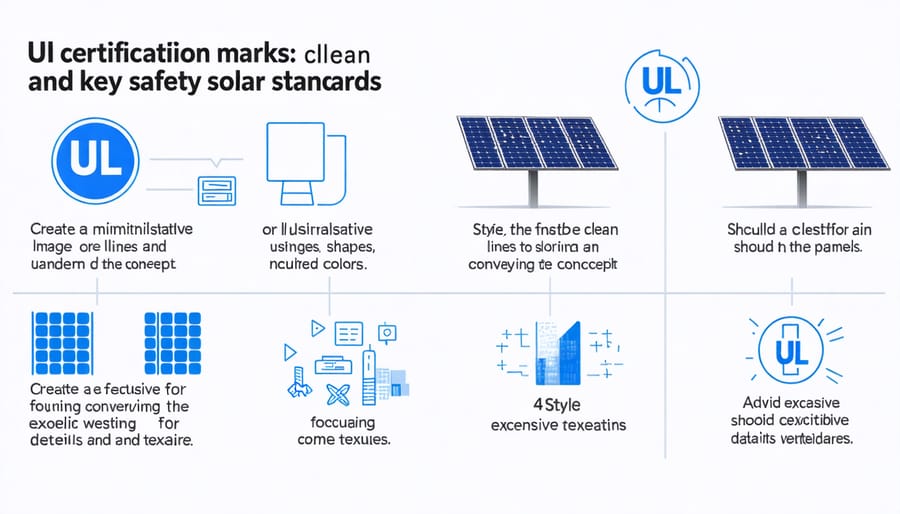
Installation Compliance Requirements
Structural Requirements and Building Codes
Before installing solar panels, it’s crucial to ensure your roof can safely support the additional weight. Most modern homes are built to handle standard solar panel installations, but a professional structural assessment is still recommended. Typically, solar panels add about 2.5-4 pounds per square foot to your roof’s load, and your roof should be able to support at least 20 pounds per square foot.
Your local building department will require documentation showing that your roof meets these structural requirements. This usually includes an engineering analysis or certification from a licensed professional. The assessment will evaluate your roof’s age, condition, and load-bearing capacity, as well as factors like snow loads in colder climates.
Key structural considerations include:
– Roof age and condition
– Existing weight loads
– Roof material compatibility
– Support beam strength
– Wind resistance requirements
– Weather exposure factors
Many jurisdictions have adopted the International Building Code (IBC) and International Residential Code (IRC) standards for solar installations. These codes specify minimum requirements for mounting systems, attachment points, and wind uplift resistance. Your installer should be familiar with these requirements and ensure your installation meets or exceeds them.
If your roof needs reinforcement, this should be completed before solar panel installation. While this adds to the initial cost, it’s essential for long-term safety and performance.
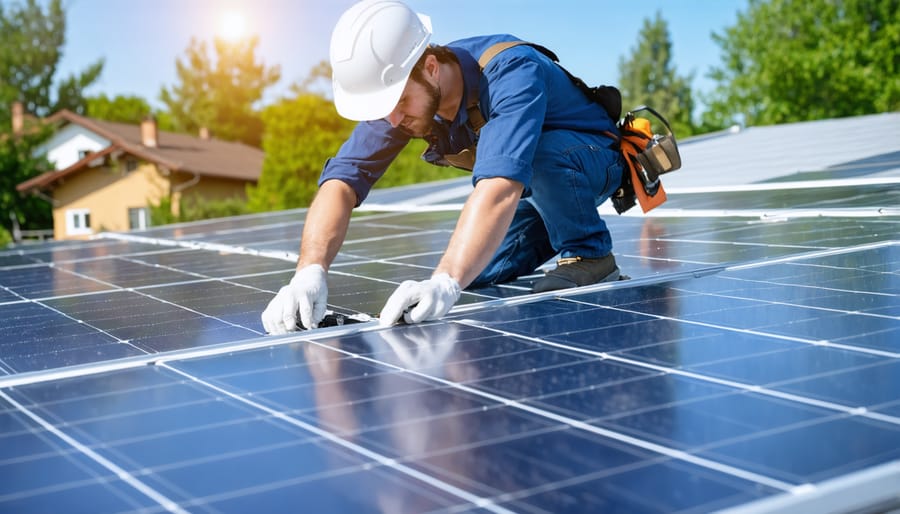
Electrical Safety and Connection Standards
Proper electrical installation of solar panels is crucial for both safety and optimal performance. All installations must comply with national electrical safety requirements and local building codes. Your solar installation should include proper grounding systems, surge protection devices, and quick shutdown mechanisms to prevent electrical hazards.
The National Electric Code (NEC) requires all solar panel systems to have clearly labeled disconnect switches that are easily accessible to emergency responders. Wiring must be properly sized and rated for outdoor use, with weather-resistant conduits protecting all cables from environmental damage.
Inverters, which convert DC power from panels to AC power for home use, must be installed by certified professionals and meet UL safety standards. Many regions now require rapid shutdown capabilities, allowing first responders to quickly de-energize the system in emergencies.
Connection to the power grid requires approval from your local utility company and must include appropriate metering equipment. Most utilities mandate the installation of a production meter and a bi-directional meter to accurately track energy flow.
Remember to work only with licensed electricians who have specific experience with solar installations. They’ll ensure your system meets all current standards while providing documentation for insurance and warranty purposes. Regular inspections by qualified professionals will help maintain the safety and efficiency of your solar installation.
Maintaining Compliance Over Time
Regular Inspection Requirements
Regular solar panel inspections are essential for maintaining system performance and safety. Most jurisdictions require annual professional inspections to ensure your installation remains compliant with local regulations. During these checks, certified inspectors examine electrical connections, mounting hardware, and overall system integrity.
Homeowners should schedule visual inspections every three months, checking for obvious issues like debris accumulation, physical damage, or loose components. After severe weather events, additional checks are recommended to verify system stability.
Key inspection points include:
– Mounting brackets and roof attachments
– Wiring connections and conduit integrity
– Inverter performance readings
– Panel surface condition
– Ground fault protection systems
Many local authorities require documentation of these inspections, so maintain detailed records of all maintenance activities. Some utility companies also conduct periodic assessments of grid-connected systems to ensure safe operation.
Consider enrolling in a professional maintenance program, which typically includes scheduled inspections, cleaning services, and performance monitoring. These programs often provide detailed reports and early problem detection, helping you maintain optimal system efficiency while meeting regulatory requirements.
Documentation and Record-Keeping
Maintaining proper documentation for your solar panel system isn’t just about paperwork – it’s about protecting your investment and ensuring long-term compliance. Keep a dedicated folder, either physical or digital, containing your installation permits, inspection certificates, and warranty information. Document all maintenance activities, including dates of cleaning, repairs, and professional inspections.
Create a maintenance log that tracks system performance, including monthly energy production readings and any unusual observations. This record helps identify potential issues early and can be invaluable when filing warranty claims or selling your home. Store copies of your utility interconnection agreement and any renewable energy certificates or incentive documentation.
Take photographs of your installation, including close-ups of equipment serial numbers and wide shots showing panel placement. Update your homeowner’s insurance documentation to reflect your solar installation. Consider using digital record-keeping apps specifically designed for solar system management – they can help automate the process and provide convenient reminders for scheduled maintenance.
Remember to share these records with family members and keep backup copies in a secure location. Good documentation habits today can prevent headaches tomorrow and ensure your solar investment remains protected for years to come.
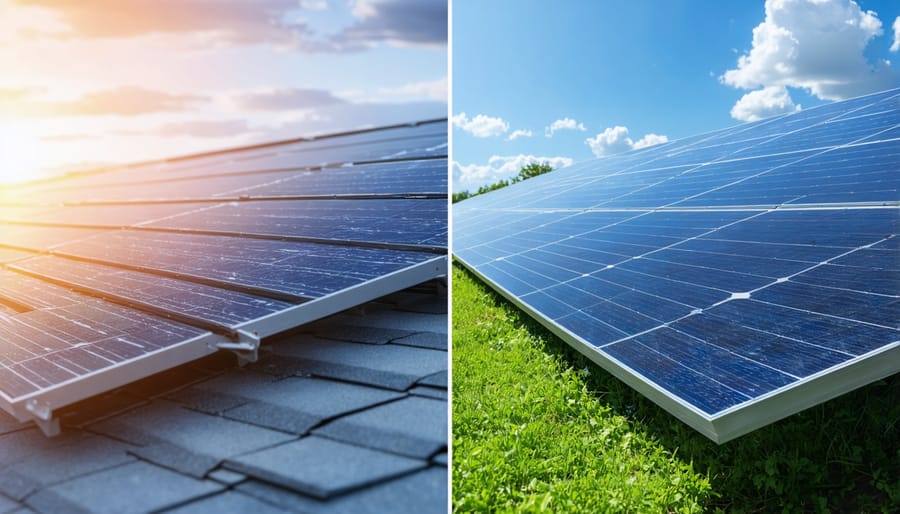
Benefits of Working with Certified Installers
Working with certified installers brings numerous advantages that extend far beyond basic installation. These professionals have undergone rigorous training and maintain current certifications in solar panel installation, ensuring your system meets all local and national safety standards.
Certified installers stay up-to-date with the latest regulations and building codes, eliminating the risk of costly mistakes or code violations. They understand the specific requirements for your area, including proper permits, electrical codes, and structural considerations. This expertise helps prevent common installation errors that could compromise your system’s efficiency or your home’s safety.
Their certification also typically comes with insurance coverage, protecting both you and your property during the installation process. Many manufacturers only honor their warranties when certified professionals handle the installation, giving you additional peace of mind and long-term protection for your investment.
These experts can also guide you through available incentives and rebates, ensuring you maximize your financial benefits. They provide proper documentation for warranty claims, tax credits, and utility company requirements. Their knowledge of optimal panel placement and system sizing helps ensure you get the most value from your solar investment while maintaining full compliance with all regulations.
Remember, proper installation is crucial for both safety and performance. The small premium you might pay for professional certification can save you significantly in the long run through better system performance, avoided repairs, and maintained warranty coverage.
Following proper solar panel regulations isn’t just about checking boxes – it’s about ensuring your investment is safe, efficient, and legally sound for years to come. When you comply with established safety standards and regulations, you’re protecting not only your home and family but also your financial investment in solar technology. Homeowners who work with certified installers and maintain their systems according to guidelines often experience fewer issues and enjoy optimal system performance.
Remember that these regulations exist to provide you with peace of mind. They ensure your solar installation meets fire safety requirements, structural integrity standards, and electrical codes. By following these guidelines, you’re also likely to qualify for insurance coverage and maintain your warranty protection. Plus, a properly regulated solar system typically maintains its value better and can even increase your property’s worth.
Taking the time to understand and follow solar panel regulations today means fewer worries tomorrow. It’s an investment in your home’s future, the environment, and your family’s safety. When done right, solar power isn’t just about saving money – it’s about smart, sustainable living with complete peace of mind.

